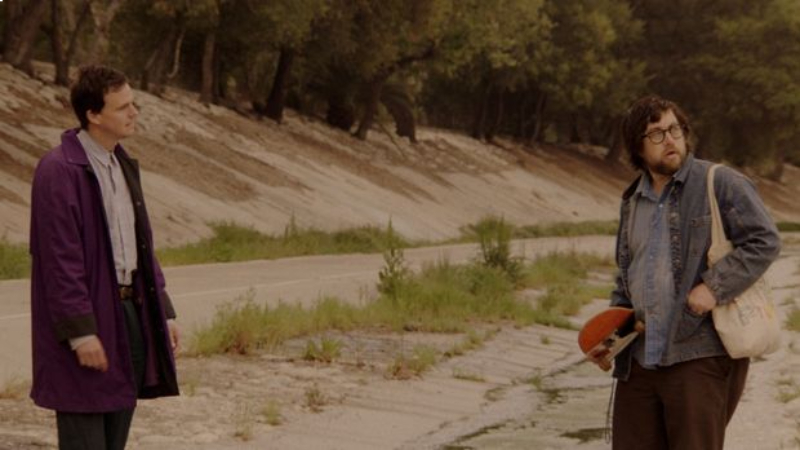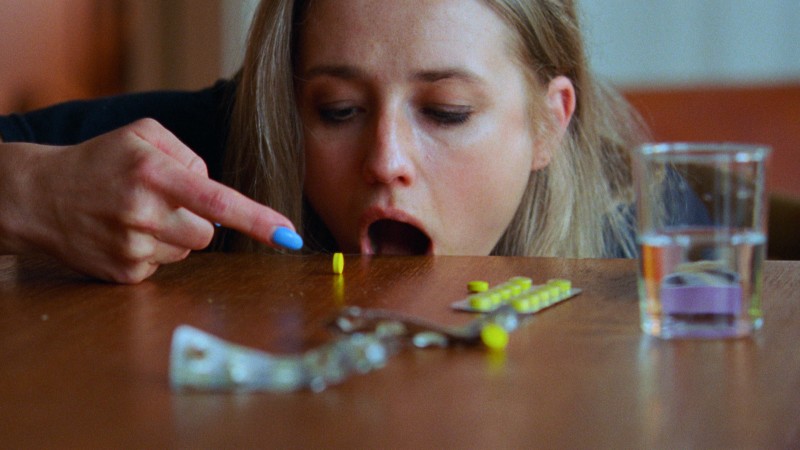Cinematic storytelling can be likened to a recycling centre, where ideas recur. While sometimes it’s an act of appropriation, other times we see ideas and character archetypes reimagined. The Civil Dead, directed by Clay Tatum and co-written with Whitmer Thomas, both of whom star in the buddy ghost comedy, is neither. It’s the type of film that has a certain indie charm that it’s easy to feel the impulse to like, but the experience quickly becomes a grind.
Set in Los Angeles, photographer Clay (Tatum) and his artist wife Whitney’s lives are uneventful, that is until she goes out of town. He’s told to not just lie around drinking beers and when he ventures out to do some photography, he crosses paths with Whit (Thomas). The pair spend the rest of the afternoon and night together, and the next morning, Whit shares the truth – he’s dead, and apparently only Clay is able to see and hear him. While Whitney’s away, the pair bond, but when she returns, Clay’s eager to drop his newfound friend like a bad habit. Only, Whit is less keen to say goodbye.
One can’t help but hear the echoes from the past, notably of Jim Carrey’s The Cable Guy (1996). Whit isn’t the hyper embodiment of Carrey’s character, but the dependency on their respective friends, in Whit’s case companionship to ease the loneliness of death, sees them both intrude on other people’s personal space.
Unlike the spiritual connection to the 1990s cult black comedy, the nod to Caspar (the friendly ghost) is intentional – appearing on television in Clay and Whitney’s lounge. It’s a direct nod to a tradition of pacifying ghosts, treating them with sympathy and revealing their friendly and eccentric natures.

The Civil Dead is always seeking to be its own thing, but it struggles to make an impression. Instead, it’s more likely to affectionately recall other films that have pacified ghosts, from director Joseph L. Mankiewicz’s gentle love story between the spirit of a sea captain and a single mother in The Ghost and Mrs. Muir (1947), to a quintessential troublemaking poltergeist in Tim Burton’s Beetlejuice (1988), and the ghosts of baseball’s past in Kevin Costner’s Field of Dreams (1989).
Tatum and Thomas’ struggle to liberate the film from its concept is compounded by the plot’s framework. It’s as if the script has not fully metamorphosed into a film; its evolution stilted. Unlike Mankiewicz, Burton and Costner, who evolved the concept into stories that feel lived by their characters, Tatum and Thomas’ story feels more like a series of underwhelming moments threaded together. It doesn’t feel an exaggeration to say that the film was born from a script still in its infancy.
The 105-minute run time places unnecessary stress on pacing and the humorous and dramatic episodes. Ironically, just as Whit intrudes on Clay’s life, outstaying his welcome, so too does the film outstay its welcome. There’s no reason why The Civil Dead couldn’t have been a sprightly 80-85 minutes, ideal for this type of comedy. Still, this wouldn’t have been a fix to deeper-rooted problems.
In moments, Tatum and Thomas strike an emotional chord that shows promise, but these are too few and far between. Often pedestrian, the skill to manipulate time and infuse the story with energy is lacking, forcing the humorous verbiage and set pieces to overcompensate. Scenes such as a hustle at a poker game and Whit’s eventual confession quickly go from being a potential highlight to a bewildering what could have been. Even the playful back and forth as Clay tries to avoid Whit when his wife returns is rushed.
Ultimately, The Civil Dead is haunted by the film it could have been. Tatum and Thomas’ charm and good intentions aren’t enough to rescue a story that’s drawn to darkly humorous twists about friendship, and the dangers of dependency.
The Civil Dead is in cinemas and on VOD from Friday, January 19th.









